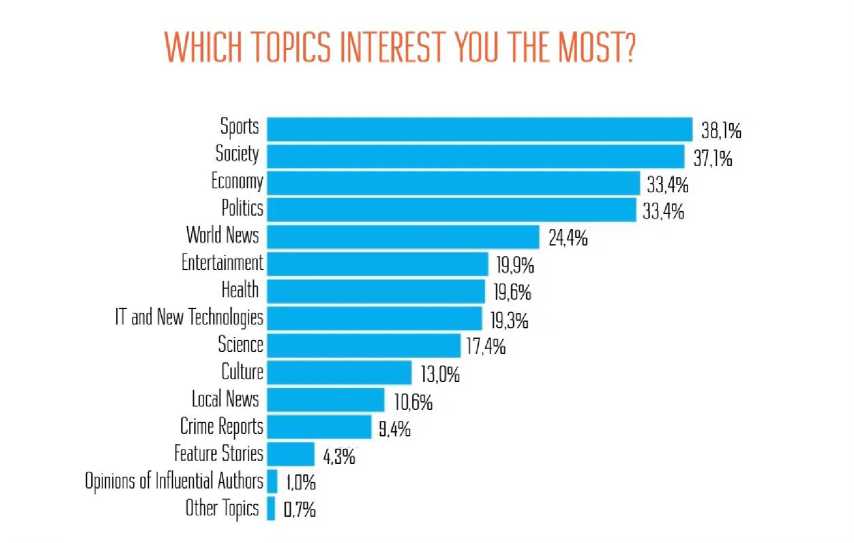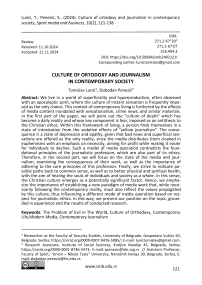Culture of ortodoxy and journalism in contemporary society
Автор: Lunić T., Penezić S.
Журнал: Sport Mediji i Biznis @journal-smb
Статья в выпуске: 2 vol.10, 2024 года.
Бесплатный доступ
We live in a world of superficiality and hyperproduction, often obsessed with an apocalyptic spirit, where the culture of instant sensation is frequently imposed as the only choice. This context of contemporary living is furthered by the effects of media content inundated with sensationalism, crime news, and similar materials. In the first part of the paper, we will point out the "culture of death" which has become a daily reality and whose key component is fear, imposed as an antithesis to the Christian ethos. Within this framework of living, a person finds themselves in a state of intoxication from the sedative effects of "yellow journalism". The consequence is a state of depression and apathy, given that bad news and superficial sensations are offered as the only reality, since the media distributes them cloaked in euphemisms with an emphasis on necessity, aiming for profit while making it easier for individuals to decline. Such a model of media operation contradicts the foundational principles of the journalistic profession, which are also part of its ethics. Therefore, in the second part, we will focus on the state of the media and journalism, examining the consequences of their work, as well as the importance of adhering to the core principles of this profession. Finally, we strive to indicate possible paths back to common sense, as well as to better physical and spiritual health, with the aim of healing the souls of individuals and society as a whole. In this sense, the Christian culture emerges as a potentially significant factor. Hence, we emphasize the importance of establishing a new paradigm of media work that, while necessarily following the contemporary reality, must also reflect the values propagated by this culture, thus influencing a different mode of media operation based on respect for journalistic ethics. In this way, we present our position on the topic, grounded in experience and the results of conducted research.
The problem of evil in the world, culture of Orthodoxy, contemporary life, modern media, contemporary journalism
Короткий адрес: https://sciup.org/170206440
IDR: 170206440 | УДК: 271.2-67"20" 271.2-67:07 316.454.3 | DOI: 10.58984/smb2402121l
Текст научной статьи Culture of ortodoxy and journalism in contemporary society
DOI:
The word "culture" comes from the Latin word "cultura" ( cultivation, respect, customs, upbringing ). It indicates the degree of social development, that is, the level of acquired behavior patterns, discreetly overlaying the ethos of contemporary man. It is one of the key factors in the sustainability/unsustainability of a society as a whole. The primacy in social life belongs precisely to culture, and the goals of society are not achieved through politics or economics but through culture (Berdyaev, 1990). Culture encompasses the relationship to friends, family, colleagues, the country, and has the strongest impact on our reality. The indispensable component of this reality is also, therefore, the media: print, electronic, as well as literature in general. They are, consequently, within our focus as we follow the analysis of the selected topic.
We live in a paradoxical time, where on one hand media and information outlets reach their peak of influence, grounded in digitalization and brief content, while on the other, they are colored by aggressive and stimulating messages, often crossing the line of objective and truthful reporting. In this paper, we will attempt to propose possible solutions based on the foundations of Christian culture, with the ultimate goal of creating a new and more humane society, where joy and goodness will be imperative and the ultimate aim. In this way, our goal is also to contribute to opening a new field of social norms and relationships.
The Culture of Death and the Media
In everyday life today, especially through media content, an instant culture is dominantly offered. The era of Facebook, TikTok, and Instagram seems to abruptly take precedence, leaving behind the decades of the established “modus operandi” of consuming print media in bookstores and various shops. Everything is accelerated and short-lived. Content does not delve into depth; rather, it offers conclusions, syntheses, and pre-established constructs before engaging the cognitive process, not “burdening” the consumer to pause, reflect, and critically analyze any phenomenon. Such weights further complicate matters, directing observers to drown in pre-conceived measures and narratives.
Numerous studies can also vividly describe the state of media (and beyond) inSerbia. For example, the website focused on media freedom and media workers, "Cenzolovka," in a 2023 article points to the issues of an anesthetized public, attacks on journalists, and a lack of solidarity.1 These are factors that undeniably ne-gatively affect freedom of expression and the development of a democratic society.
In support of our thesis that the media in Serbia have significantly regressed, we can also mention a study on the media representation of children, conducted before the pandemic by CEPROM 2 . The research was carried out on national television channels (RTS 1, TV Pink, TV Prva, TV O2, and TV Happy), as well as in seven daily newspapers (Danas, Politika, Večernje Novosti, Blic, Kurir, Informer, and Srpski Telegraf). 3
The results show that the daily average of aired segments or printed articles about children does not exceed the number 1. This clearly indicates the level of in-terest in the most vulnerable population. Furthermore, almost 60% of reports about children in print media have a negative connotation, while in video content, that percentage is better (around 30%). Nevertheless, the cumulative result shows that nearly half of the reports have a negative connotation. Alarmingly, in as much as 60% of these reports, the topics relate to child abuse, drug addiction, accidents, and violence, while only occasionally does a positive news story about young people's successes and achievements emerge (see Figure 1).
Professor Veselin Klajić from the Faculty of Political Sciences at the University of Belgrade notes that sensationalism is the reason for the media's approach mentioned above, but he also emphasizes that the special danger lies in the fact that this concerns the most sensitive social groups, and the consequences in this context are dire. Klajić concludes: "Sensationalism at the expense of content is the formula for success for most domestic media, and this research has confirmed it. This prac-tice has lasted for a decade continuously, with a constant increase in the intensity of that sensationalism, so what were once shocking news stories have today become just one of a hundred similar news stories that the media bombard us with every day. When a person becomes desensitized to such content in the media, which inevitably happens when exposed to it daily, the threshold of tolerance for violence and various other incidents in everyday life increases, which is the most dangerous consequence of such reporting." 4
How Do Media in Serbia Report on Children?
INDIFFERENCE
NEGATIVITY
SENSATIONALISM

Television on national frequencies and daily newspapers publish on average less than one report dedicated to children per day. Television broadcasts an average of 0.80 reports per day. Daily newspapers publish an average of 0.94 articles per day.

More than half of all reports published by television and daily newspapers are related tn child abuse, accidents, violence, and drug use

In every tenth article, ethical principles and the Code of Journalists of Serbia are violated when reporting on children
Figure 1. 5
In overcoming the problem of reporting on youth (especially children), on one hand, adherence to the provisions of the Journalist Code of Serbia should be promoted, but a comprehensive "sobering" would also be beneficial. The foundations of this can be seen in moral and ethical principles, as well as in the basic culture of individual behavior, whose basis we can undoubtedly find in the Christian ethos.
In 2023, CEPROM also conducted research on the biggest obstacles to introducing subscriptions for online media in Serbia. These primarily include distrust in the media, "copy-paste" journalism, excessive advertising, and clickbait content (see Figure 3). The same center also conducted research on the topics that interest viewers the most (see Figure 2). The study was conducted on a sample of 700 adult citizens of Serbia.

Figure 2. 6
The results of this research also indicate the current state of the nation. Firstly, we see that the greatest interest is in sports, the economy, and politics. Interest in reports, science, and culture is below a modest 20%. Furthermore, the population primarily gets its information through internet portals, social networks, and TV. In this way, media content consumers obtain more than 95% of their information, while print and radio sources account for less than 2%. An interesting result also shows that only 20% of people have paid for any media content. Indirectly, it is thus clear how much trust there is today in media companies as sources of information.
6 For more details: (accessed September 26, 2024).
HDWDO YOU MOST OFTEN GET INFORMED?
Online media (websites, portals) i
55%
Social networks
22,4%
TV
21%
Radio 11%
Printed newspapers 10,6%
FOR WHICH TYPES OF CONTENT HAVE YOU PAID?
HAVE YOU EVER PAID
FOR ONLINE NEWS OR MEDIA CONTENT?

Video content
Multimedia content
Classified text
Audio content/podcasts
Comments/columns by unknown authors ^|
Ии 11,5%
8,3%
63.2%
26.3%
22,6%
21,8%
Figure 3. 7
Finally, the research shows that media consumers primarily pay for multimedia and video content. Only about 20% pay for columns by well-known authors, audio content, and so-called classical texts. From all of the above, we can conclude that the relationship of media consumers is mostly superficial, and they are insufficiently critically oriented toward the content they use. It is evident that the average user is largely passive and uninterested in deeper analytical forms, focusing primarily on sports and entertainment, as well as superficial information about political and economic topics.
We believe that all of this creates a wide field for abuses, manipulation, and other negative influences. Therefore, there is an imperative for the rapid engagement of all important capacities, along with serious control over the selection and processing of information that is published, through a holistic approach. This means working actively to establish a new system of information and education, whose foundations must be based on respect for ethical and moral principles, also contained in the Christian cultural heritage.
An additional problem, viewed globally, is the so-called anti-culture, whose foundation can be found in the era of superficiality and obscurity in which we live. There are numerous examples worldwide of popular events that reflect such phenomena in all segments of modern society. Our society is also affected by these trends. It is as if a new value system is being subtly imposed, whose foundations are not based on Christian culture and moral values in a broader sense, but rather on principles permeated by the results of fallen human nature. The ethical frameworks that are thus propagated are, therefore, at least un-Christian, and fail to truly measure up to humanity.
We can thus conclude that we are dealing with a culture of death, as its strongest component is godlessness and disrespect for principles and authority in a broader sense. Thus, everything that is an antithesis to life, prosperity, and development is part of this culture. From this perspective, in the media, human suffering, pain, and death are presented euphemistically, in a manner acceptable to the broader population, where we encounter terms like reduction and loss of human resources, collateral damage (and errors), while on the other hand, death is presented as a result, reducing humans to beings living under an apocalyptic spirit burdened by the end times.
The Christian perspective, however, is different and stands in opposition to the culture of death. It offers hope for new life, for Resurrection, and the ultimate victory of life over death. The aim of this text is to point out an alternative path, that counterbalance and antithesis to death and suffering. It also highlights the role of information in this regard—thereby including media actors and their responsibilities along this path.
A Sacrifice for the Life of the World
Modern individuals are often burdened by problems, leading them into a state of hopelessness. As we live in a secular society where the experience of life is seen as meaningful and significant in and of itself, disconnected from anything that could be termed transcendent, the meaning of life is ultimately reduced to a lack of meaning (Schmemann, 2014: 26). In this context, it is not surprising that studies show that the leading disease of the 21st century is depression. This leaves many questions unanswered, and ultimately, death presents itself as the only certainty, often trapping individuals in a cycle of awaiting a catastrophic outcome to happen. The result is depression, apathy, and fear of death. Here, we can notice the connection between today’s culture and the global media landscape, which is dominated by superficial entertainment and low passions.
The Christian ethos stands in stark contrast to this. Orthodox culture, therefore, points to the One who created the world, who sacrificed Himself for it, and who alone can save it. He offers the ultimate victory of good over evil, of life over death. “Death is swallowed up in victory. O death, where is your sting? O Hades, where is your victory?” (1 Corinthians 15:54-55). The essence lies in finding the meaning of life that transcends the “merry-go-round” of sorrow, death, and evil. Death is not part of God’s original plan but is the result of subsequent circumstances. Humans were not created to die; however, after the fall into sin, they become subject to death and the laws of decay, as they freely chose death. God created the world out of nothing, and life without God is non-existent. However, after the fall, humanity becomes mortal, and death turns from a possibility into a reality. Nevertheless, all rational beings can be recreated because God is love, and this is part of His plan. Everything God created will not return to absolute nothingness, and all that He has created—rational beings, angels, and humans—will not cease to exist, although only those who are godlike will receive eternal life. 8
That hope, that joy, that light, is He who gave us everything and paid the price with His blood, opening the path to salvation. “He has blessed the world, He has blessed man, He has blessed the seventh day (i.e., time), which means He has filled everything that exists with His love and goodness.” (Schmemann, 1979: 15). On the other hand, humanity stands at the center of the world, uniting it through the act of blessing God, receiving the world from God and offering it back to Him. By filling the world with this gratitude, this Eucharist, humans transform their lives—from a life received from the world to a life in God, in communion with Him. The world was created as “matter,” the material of a comprehensive Eucharist, and humans were created as the priests of this cosmic sacred mystery (ibid). All of this is something that humans feel even instinctively, and the centuries of secularism, including the contemporary culture of death that we can view as a contour, a paradigm of modern culture, have not managed to separate humanity from God, from the source of life.
Conversely, it has become natural for humans not to live a life of gratitude and not to be eucharistic, as they have forgotten that God is present in everything. It seems as though we are surrounded by an all-encompassing secularism attempting to steal the world from God (Schmemann, 1979: 16). In this context, we can also view the culture of living. Therefore, it is necessary for humanity to change, to turn to the source of life, to commune with God in whom all life exists, so that they can receive the eternal gift of life. From this perspective, we can lay a foundation for further action and existence, for otherwise, the agony will not cease, and life will be reduced to utilitarian and instinctual satisfaction of superficial human, primarily hedonistic, needs.
Morality and Ethics in a Mediatized Reality
In contemporary everyday life, the categories of morality and ethics are often misunderstood and frequently perceived as the same. Although they cannot be considered separately in practice (without understanding the other), it must be noted that "morality, as an absolute and universal category, represents a set of rules that individuals accept and strive to obey," while "ethics represents a rational process of applying existing principles when two moral constraints collide" (Milenković, 2023: 17). Thus, examining the relationship between these two categories (morality and ethics), it should be emphasized that morality actually represents "a set of universal rules by which people govern themselves to become part of the social community in which they live", while ethics "contrary to the universality and absoluteness of moral rules, represents the personal application of certain values," concludes the same author (ibid: 18).
This leads us to recognize individual professional ethical frameworks that accompany specific occupations, such as journalism. The ethics of the information field encompasses three primary levels: descriptive, strategic, and normative (ibid: 20). Additionally, Dale Jacquette emphasizes that journalistic ethics can be succinctly represented as "the obligation of journalists to report truthfully to the greatest extent possible about matters relevant to the public interest" (2007: 19). The fundamental dimensions of journalistic ethics are freedom of information, truth, and respect for human dignity, which gain much of their formalization in the practice of this field through the self-regulatory framework of the journalistic profession, operationalized through journalistic codes and the role of professional bodies and organizations. Alongside them, as a kind of bulwark and corrective, stands the valid formal-legal framework that protects media actors and the public while compelling media professionals to adhere to rules derived from the aforementioned ethical dimensions. However, in practice, both of these dimensions of normative and responsible media work are often marginalized due to the diversity of practices worldwide and from one media organization to another, particularly due to the absence of penalties and insufficient specificity of formal rules and measures of their adherence.
Jacquette rightly reminds us that "journalists have special moral rights, along with associated moral responsibilities" (2007: 21), while "the ethics of any profession, including journalism, provides a miniature model of moral values" (ibid: 28). The basic principles of valid journalistic practice are also contained in the portion of the Munich Declaration from 1978 that pertains to: 1. freedom of expression and criticism; 2. protection of professional independence and integrity of journalists; 3. respect for truth, fairness in the information-gathering process; 4. respect for sources of information; 5. elimination of all forms of discrimination and ensuring equal treatment for all in the reporting process (according to Milenković, 2023: 45). Rowland Lorimer noted that the journalism profession has "a set of ideals to which its employees adhere and invoke in their work," and that "modern journalism sees these ideals in the social position and role of the media and their profession" (1998: 150–153). Their ideals are focused, as he also points out, on "the pursuit of information, based on a commitment to treat events and individuals impartially and fairly, and to respect the welfare of the community and humanity in general, in a spirit devoid of cynicism" (Lorimer citing the conclusions of the "Royal Commission on Daily Newspapers in Canada" from 1981). These ideals are thus perceived as a logical extension of one of the basic rights of every individual—freedom of speech— and they have historically helped this profession maintain its significance, rights, and place in society while also influencing the formation of norms that protect the rights of the profession itself.
Although often unaware of it, journalists frequently find themselves in situations that lead to moral reasoning contained in the phases of the so-called ethical decision-making formula, which involves "defining the situation, analyzing it, and making an appropriate decision regarding the identified ethical issue," which requires assuming the role of a moral agent and defending the decision made based on moral theory (Day, 2008: 88–96). In this way, their responsibility in practice is manifested and can be interpreted. The responsibility of the media, however, is "not merely a summation of the individual responsibilities of journalists, but implies a systemic approach to the media's duty to the public under certain social conditions," emphasizes Vesna Milenković (2023: 96), adding that "only free journalism is ethical, and a moral journalist is a professional who respects the principles of their profession" (ibid). Milenković, in fact, is another among those who highlight truth as the greatest value of journalism, which implies "the journalist's ability to document every claim or refute every contradictory statement" (2023: 31). Thus, she reminds us, we arrive at the value-ideal of objectivity that must accompany journalistic work, which, as a kind of ideal that must be strived for in practice, means "representing the entirety of an event, i.e., as it truly happened, without omitting any moments" (ibid). Adopting the imperative of loyalty to the truth and striving for objective reporting leads us, in an overall sense, to the necessary level of journalistic professionalism (and thus a return to the ethical relationship towards journalism itself), a value particularly evident in the journalistic self-regulatory framework, which signifies adherence to truth, fairness, accuracy, impartiality, and balance (ibid).
A particularly important issue, therefore, is one that has long been levitating outside the necessary formal grounding and media-social respect—the importance of adequate institutionalization of journalistic ethics and its systemic framing. On the other hand, journalistic ideals (thus also their rights, but also obligations) are often opposed to the current reality, dominantly dictated by the fields of politics and economics. The consequence of these two facts "is a fully organized, and quite negative model, which is currently evident in a dominant antisocial approach to creating media content", which is reflected in inhumane behavior (we see a metastasis of this in reality formats), hate speech (it suffices to superficially analyze the content of the most popular media enterprises), and various dirty tricks (such as false announcements of one type of information, followed by distraction to something entirely different, often offensive) (Milenković, 2023: 124).
The epilogue that we clearly see described is largely evident in this text. Focusing on the society of which we are a part, in this segment we can characterize it in the following manner: "The estradization and tabloidization of the media field, as dominant trends in the turbulent domestic media market, arising from a primary desire for quick profits at any cost, today reach their climax, encompassing almost all domestic media" (Penezić, 2023: 102).
Original Principles of the Profession and the Importance of Ethics in Journalism
Taking into account the current trends in the media market and the undeniable importance (influence) of the role that media actors have, one of the more frequent starting points for analyzing their work is the long-standing assessments in this area frequently cited from John Keane, who noted three decades ago that the role of the media rests on the principles of independence, objectivity, and truthfulness (1995). Namely, media enterprises (MEs) or, more specifically, media actors, investigate and interpret the world around us and are often the last line of defense for broader social interests. The importance of adhering to the principles named by Keane is particularly pronounced today, as MEs must, as emphasized by Peter Dahlgren, be an integrative force and a forum for democratic debate, thereby connecting citizens with political life, given that the state of the media reflects the democratic potentials of society" (in Zelizer, 2009: 153). Quality media "investigate and interpret the world around us, while those with a broader, so-called global influence create global agendas and discourse in which the most important topics are interpreted and then concrete steps are taken, thus serving as a bridge to important information and individuals who would otherwise be inaccessible to most of the audience" (Penezić, 2023: 50).
Dominant models of media work (the consequence of their reporting) today, however, even at a layman's glance, provide an argument for those who consider them one of the primary generators of contamination of the public sphere, thus fostering global confusion and atomization of individuals in contemporary society. Simultaneously, we can reasonably conclude that in this way, ME have distanced themselves for a long time from their original principles and ideals of journalistic profession.
The first victim on this path has long been journalistic ethics. Along with it, the moral principles of media actors inevitably suffer, but equally victimized are the entire public and society, i.e., public interest and the broader social framework in which they play a very important role. However, what also becomes a victim, and of which media actors themselves are paradoxically mostly unaware, is their business stability and long-term survival in the market, which they strive for through such business strategies. All of this is a consequence of trends that have long dominated the media market, shifting the pendulum of the media's functioning increasingly away from its primary informative function toward entertainment, all while entirely neglecting the educational role, which is the third of the basic media responsibilities.
Chuck Moozakis noted more than a decade ago (2012) that, on the one hand, we are "in the most dynamic decade in terms of changes within the media sphere, and everything is oriented toward predictions of what the outcome will be", but on the other hand, it is also a fact that "modern societies today depend the most on quality information, which is increasingly lacking" (according to Penezić, 2023: 85). Significantly before him, Horkheimer and Adorno reminded us that journalism informs, educates, entertains, socializes by transmitting values and norms of behavior, and influences the way people think (according to Milenković, 2023). Vesna Milenković also points out that the power of the media in the information society is increasing, which "indicates the enormous social influence of journalists in uncovering the negative aspects of power centers, as well as the responsibility of journalists for the development of the public and the community in general" (Milenković, 2023: 49).
Media Actors Trapped in Their Own Delusions
The two main directions (tasks) of MP and media actors are the protection of public interest and the pursuit of profit, with the former often being neglected today. "Media, for the most part, follow current socio-political trends, which is a consequence of prioritizing market success at the expense of adhering to original principles" (Penezić, 2023: 50). The claims of those who observe the media reality are also justified when they note that there has been a "negative convergence of the editorial and advertising sectors, resulting in poor editorial work and low-quality content" (ibid: 97).
Thus, the necessary adherence to journalistic ethics – and therefore the category of journalistic professionalism and commitment to the original ideals of the profession becomes relatively unimportant in today's reality of media actors. As a result, the gap within the media and wider social reality itself is widening daily, a process fueled by the media actors themselves, which, paradoxically, harms both them and the business organizations they are a part of. Consequently, of course, it also harms the public and society in which they exist.
Considering the spirit of the times, strongly shaped by the influences of economic and political factors, it is justifiable to note the presence of such influences in the world of media and journalism. They are quite evident in their work, and therefore in the consequences – for society, and certainly for the media and media actors themselves. As Dahlgren observes "the general culture of media business impacts the deterioration of working conditions in aspects of functional flexibility and respect for professional solidarity within the media" (in Zelizer, 2009: 151). In choosing such a way of working, it is often (perhaps deliberately) forgotten that "the key role is played by the management-editorial structure, which manages media resources (money, people, and information)," and that the steps they take are aimed at activities "intended to maintain and achieve a level of desired profitability through various inadequate measures, leading to activities and content that deviate from so-called quality journalism and create new problems rather than solutions" (Penezić, 2023: 48).
This represents a rather evident delusion of key media actors, who, by following the influence of power centers outside the ME themselves, consciously deviate from the moral-ethical framework that is also part of the formal frameworks of their profession. This brings us to the importance of the issue of media integrity. More specifically, it refers to its "connection with the current situation, which is related to the individual integrity of media employees, and primarily to the integrity of media enterprises as a whole" (ibid: 64). Media integrity actually refers to "the characteristics of the media system that affect the way the media operate – media policies, structures, practices, and their relationships that enable them to serve the public interest and democratic processes, demonstrating a certain type of practice in business and content – specifically, it refers to the media's ability to: 1. provide accurate information without serving various authorities or being dependent on them; 2. ensure citizens have access to information and the ability to express diverse opinions without bias or propaganda" (according to Petković, 2014: 21).
On the other hand, we must always remind ourselves that quality journalism "begins where one bravely goes beyond the necessary agenda of daily reporting on current events, following topics that fundamentally affect the entire society. Only in this way can the media and their employees count on long-term audience loyalty, on which their business survival and development mostly depend" (ibid: 67).
Analyzing the contours of the society and the times we live in, we can, therefore, quite justifiably conclude the apparent irresponsibility and unprofessionalism, behind which undoubtedly stands "the disinterest in the individual roles, responsibilities, and problems of media employees, especially media management, which certainly makes key decisions regarding the media's market orientation and audience selection, the organization of work and relations in the newsroom, as well as relations with so-called external actors" (Penezić, 2023: 112). The obvious decline in media professionalism and integrity is "certainly a direct consequence of the very negative state of the media world," and the result of all this is "low-quality media reporting and poor content, but in the long run, the existence of those media may also be at risk" (ibid). Thus, one of the central points of consideration regarding media work for some time has been the recognition of a global media crisis and its consequences. As one of the more direct consequences of economic factors, it has resulted in "global distrust, which, in combination with the technological revolution and structural economic changes, created the effect of a perfect storm" (ibid: 84), marking the end for many previously influential media platforms.
Christian Ethos and Journalism
Journalism is at a crossroads, also as are the ME in which it primarily takes place. Both are being abused in every possible way to satisfy the lowest human needs. The race for money has caused this situation. Morality, ethical codes, and the culture of professional reporting are increasingly being excluded. It's as if there are no boundaries or restraints. The problem is that culture today, in a broader sense, has become cheaper, more accessible, more useful, and more comfortable, but it is losing quality, becoming ugly and "devoid of style," thus transitioning into civilization (Berdyaev, 1990). "Cutting culture off from sanctity is cutting culture off from cult, from the spiritual core and essence of culture" (Purić, 2021: 4).
Therefore, we believe that a fundamental, radical change in the view of life and social relations as a whole is necessary. Not everything can be free and without restrictions. Similarly, not everyone should publicly express their opinion on something without respecting codes of conduct, the original principles of the journalistic profession, and ethics in journalism in general.
True Christianity is that "light at the end of the tunnel." Christianity is "the proclamation of joy, the only possible joy on earth, and with that joy, it transforms the End into the Beginning" (Schmemann, 1979: 23). Loktionov goes further and states that the common foundation of both upbringing and education is religion. "True moral upbringing exists only in a close, indissoluble unity with religious education and upbringing, and outside of religion, there can be no talk of any moral upbringing" (Loktionov, 1997: 46). Therefore, there are spiritual priorities in the process of moral and cultural renewal. "Culture and all its components historically fell out of their nest or represent torn links of a more serious and creative art – theurgy or divine action... this divine action was the maternal cradle of all sciences and all activities" (Florensky, 1997: 85-248).
We believe that this is where we could seek the foundation for resolving the problems within and around the media and media actors, i.e., their approach to work and the consequences they thus cause.
Conclusion
In the end, we can turn to the justified position that culture is a product of free human activity and creativity. From a Christian standpoint, it implies a collaboration between man and God, and it does not tolerate the separation of human activity from church faith. After everything stated, we can rightfully include contemporary journalism in this framework, which is indeed the subject of our research. Journalism represents a unique dimension of human life and activity, but it must not stray from fundamental moral boundaries or from the moral dimension of culture. Consequently, it must also remain within the framework of its ethics and professional standards. This, therefore, is the formula or equation that includes a moral vertical in reporting.
We can conclude by using the words of Evgenii Trubetskoy, who states that human will and human intellect are called to participate in the creative work of God. The entirety of human culture, science, art, and social activity serve the purpose of man's calling to be a collaborator in building God's house on earth. Ultimately, man must strive for a better world and not capitulate before the evil that prevails in the world (Trubetskoy, 1995: 286-288).
Список литературы Culture of ortodoxy and journalism in contemporary society
- Berđajev, N. (1990): Filozofija nejednakosti, Mediteran, Oktoih, Beograd.
- Brigs, A., Kolbi, P. (2005): Uvod u studije medija, Clio, Beograd.
- Dej, L.A. (2008): Etika u medijima, primeri i kontroverze, Čigoja štampa, Beograd.
- Žaket, D. (2007): Novinarska etika, Službeni glasnik, Beograd.
- Kin, Dž. (1995): Mediji i demokratija, Filip Višnjić, Beograd.
- Lorimer, R. (1998): Masovne komunikacije, Clio, Beograd.
- Kravčenko, A. I. (2001): Kulturologija, Projekat Akademije, Moskva.
- Loktionov, V. (1997): Ka problemu demitologizacije odnosa nauke i religije u okvirima savremene evropske kulture. U: Kojić, T. (ur): Duhovnost, patriotizam, tradicije, Eparhija raško-prizrenska.
- Milenković, V. (2022): Uvod u novinarstvo, Fakultet za sport, Beograd.
- Milenković, V. (2023): Etika i kodeks novinarstva, Fakultet za sport, Beograd.
- Purić, Episkop J. (2021): Hrišćanstvo i kultura, Ruski pogled na kulturu, Alta Nova, Beograd.
- Penezić, S. (2023): Savremeni izazovi upravljanja medijima, Fakultet za sport, Beograd.
- Petrović, R. i Penezić, S. (2023): Sergije Lukac – prometeј novinarstva, Službeni glasnik RS i Fakultet za sport, Beograd.
- Petković B. (ed.). (2014). Media Integrity Matters, Reclaiming Public Service Values in Media and Journalism, Ljubljana: Peace Institute - Institute for Contemporary Social and Political Studies.
- Pralica, D. & Valić Nedeljković, D. (2020): O novinarstvu i novinarima, Filozofski fakultet, Novi Sad.
- Trubeckoj, Knez J. (1997): Smisao života, Logos, Beograd.
- Florenski, P. (1997): Iz bogoslovskog nasleđa. Predavanja na Moskovskoj Duhovnoj akademiji (1917-1919). Izdanje Moskovske Patrijaršije, Moskva.
- Šmeman, A. (2014): Liturgija smrti i savremena kultura, Kalenić, Kragujevac.
- Šmeman, A. (1979): Za život sveta: svetotajinska filosofija života, Pravoslavlje, Beograd.
- Zelizer, B. (2009): Tabloidization, technology and truthiness, Routledge, London.
- https://www.danas.rs/vesti/drustvo/nepoverenje-i-nekvalitetan-sadrzaj-najveceprepreke-za-uvodjenje-pretplate-na-onlajn-medije-u-srbiji/#comment-formdiv](https://www.danas.rs/vesti/drustvo/nepoverenje-i-nekvalitetan-sadrzajnajvece-prepreke-za-uvodjenje-pretplate-na-onlajn-medije-u-srbiji/#comment-formdiv, pristupljeno 26. 9. 2024.
- https://jugpress.com/kako-mediji-u-srbiji-izvestavaju-o-deci-nezainteresovanonegativno-senzacionalno/](https://jugpress.com/kako-mediji-u-srbiji-izvestavaju-odeci-nezainteresovano-negativno-senzacionalno/, posećeno 2. 10. 2024.
- https://www.cenzolovka.rs/pritisci-i-napadi/medijska-slika-srbije-anesteziranajavnost-napadi-na-novinare-i-manjaksolidarnosti/](https://www.cenzolovka.rs/pritisci-i-napadi/medijska-slika-srbijeanestezirana-javnost-napadi-na-novinare-i-manjak-solidarnosti/, pristupljeno 26. 9.2024.
- https://www.youtube.com/watch?v=72qay7Y1ZfU, pristupljeno 1. 10. 2024.


